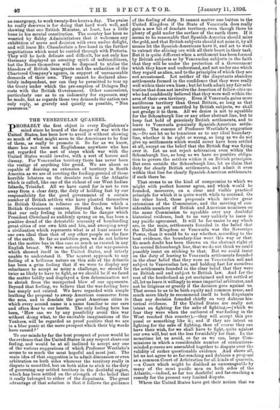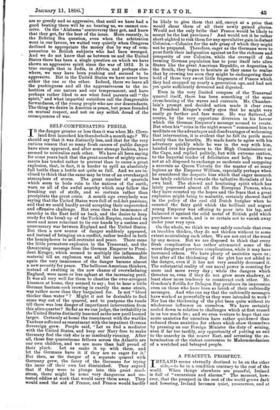THE VENEZUELAN QUARREL. P ROBABLY the first object in every Englishman's
mind since he heard of the danger of war with the United States, has been how to avoid it without showing so much of what might seem to the Americans to be fear of them, as really to promote it. So far as we know, there has not been an Englishman anywhere who has not regarded the sort of steps which war with the United States would involve, with a sort of horror and dismay. For Venezuelan territory there has never been the vestige of anything like greed. We are about as capable of desiring an extension of territory in South America as we are of coveting the feeding-ground of those horrible lobsters on the desolate rock in the Atlantic which is called, like one of the richest of our West Indian Islands, Trinidad. All we have cared for is not to run away from a clear duty, the duty of holding fast by our responsibility for the good government of a certain number of British settlers who have planted themselves in British Guiana in reliance on the freedom which a British Government ensures. Beyond that, we believe that our only feeling in relation to the danger which President Cleveland so suddenly sprang on us, has been a positive dread of the detestable necessity of bombarding great cities of our own kith and kin, and sweeping away a civilisation which represents what is at least nearer to our own ideal than that of any other people on the face of the earth. So far as ambition goes, we do not believe that the motive has in this case so much as existed in any English breast. We were astounded at the war-passion which showed itself in the United States, and utterly unable to understand it. The nearest approach to any feeling of a bellicose nature on this side of the Atlantic has been a grim feeling that if we were to display any reluctance to accept so noisy a challenge, we should be twice as likely to have to fight, as we should be if we faced the matter boldly and displayed a firm determination not to shrink from the unexpected blow of our opponents. Beyond that feeling, we believe that the war-feeling here has simply not existed. We have regarded with simple loathing the proposal to sweep American commerce from the seas, and to desolate the great American cities in which every second name is a name familiar to our ears and often dear to our hearts. The only feeling here has been, How can we by any possibility avoid this war without doing what, to the excitable imaginations of the Yankees, will be regarded as proof positive that we are in a blue panic at the mere prospect which their big words have caused?'
To our minds by far the best prospect of peace would be the evidence that the United States in any respect share our feeling, and would be at all inclined to accept any one of the various suggestions of which Professor Westlake's seems to us much the most hopeful and most just. The main idea of that suggestion is to admit discussion or even arbitration on both sides wherever the territory really in dispute is unsettled, but on both sides to stick to the duty of goveniing any settled territory in the doubtful region, which has been settled on the strength of the belief that it really belonged to either of the disputants. The great advantage of that solution is that it follows the guidance an emergency, to work twenty-five hours a day. The praise of the feeling of duty. It cannot matter one button to the he really deserves is for doing that hard work well, and United Kingdom if the State of Venezuela does really showing that one British Minister, at least, has a little gain a new bit of desolate territory, even though there be bone in his mental constitution. The country has been so plenty of gold under the surface of the earth there. If it wearied by flabby Administrators that it welcomes any seems to be reasonable that Spanish-America should mine exhibition of nerve and decision with even undue delight, the gold, and that British subjects should not mine it, by all and will leave Mr. Chamberlain a free hand in the further means let the Spanish-Americans have it, and set to work negotiations which must be carried through with Pretoria. to extract the shining ore with all their heart in their task. They will be both delicate and difficult, for not only has But it is quite different when a settlement has been formed Germany displayed an amazing spirit of unfriendliness, by British subjects er by Venezuelan subjects in the faith but the Boers themselves will be disposed to utilise the that they will be under the protection of a Government blunders of British immigrants and the audacities of the which they know and understand, and not under one which Chartered Company's agents, in support of unreasonable they regard as alien, and to the principles of which they are' demands of their own. They cannot be declared abso- not accustomed. Let neither of the disputants abandon lutely independent, nor can they be permitted to tear up settlements formed in the confidence that they were really the treaty under which the pre-emption of Delagoa Bay well within their own lines ; but let both admit any fair arbi- rests with the British Government. Other concessions, tration that does not involve the desertion of fellow-citizens particularly one as to an indemnity for expenses, may who had confidently believed that they were well within the be made, but as regards those two demands the nation can area of their own territory. Even if Venezuela gains more only reply, as gravely and quietly as possible, " Non auriferous territory than Great Britain, so long as that That seems to us the kind of compromise to which we might with perfect honour agree, and which would be founded, moreover, on a clear and visible practical principle for which it is quite worth while to contend. On the other hand, those proposals which involve great extensions of the Commission, and the meeting of con- siderable numbers of British and American nominees on the same Commission to squabble over any doubtful historical evidence, look to us very unlikely to issue in any pacific agreement. It will be far easier to say which are, in the main, settlements founded in the belief that the United Kingdom or Venezuela was the Sovereign Power, than it would be to say whether, according to the best evidence, the boundary-line went this way or that. So much doubt has been thrown on the abstract right of the second Schomburgk line, that we do not think we could possibly insist on sticking to that. But we could insist on the duty of leaving to Venezuela settlements founded in the clear belief that they were on Venezuelan soil and subject to Venezuelan law, and holding fast for ourselves the settlements founded in the clear belief that they were on British soil and subject to British law. And for the rest of the borderland as yet unclaimed and not settled at all, let us leave it willingly to some impartial arbitrator, and not be litigious or greedy if the decision goes against us. That seems to us to be both equity and common sense, and much more likely to recommend itself to both disputants than any decision founded chiefly on very dubious his- torical evidence. If the United States are really not intent on fighting for the sake of fighting,—(which we fear they were when the outburst of war-feeling in the West reached this country),—they will accept this pro- posal or something like it ; and if they are intent on fighting for the sake of fighting. then of course they can have their wish, for we shall have to fight, quite against our own will, but not the less formidably for that. In the meantime let us avoid, so far as we can, large Com- missions in which a considerable number of contentious- minded persons are assembled together to dispute over the validity of rather questionable evidence. And above all, let us not agree to so far-reaching and dubious a proposal as a common Court of Arbitration for all kinds of quarrels, —a Court which might be disliked as unmanageable by many of the most pacific men on both sides of the Atlantic,—indeed, as far too doubtful and far-reaching a remedy for the present very limited dispute.
Where the United States have got their notion that we are so greedy and so aggressive, that until we have had a good beating there will be no bearing ns, we cannot con- ceive. On the ' Alabama' controversy they got, and knew that they got, far the best of the issue. More recently, in the Behring Sea question, even when the arbitration went in our favour, we waited very quietly when Congress declined to appropriate the money due by way of com- pensation to British subjects who had been wronged. And we do not know that as between us and the United States there has been a single question on which we have shown an aggressive spirit since the war of 1812. It is true enough that in India, in Africa, and perhaps else- where, we may have been pushing and seemed to be aggressive. But in the United States we have never been either the one or the other. Indeed, there we leave all the pushingness and all the aggressiveness to the in- heritors of our nature and our temperament, and have perhaps rather liked to see what fond parents call " the spirit," and what impartial outsiders call the disagreeable forwardness, of the young people who are our descendants. The thing we desire in America is peace, but peace founded on mutual respect, and not on any selfish dread of the consequences of war.



































 Previous page
Previous page